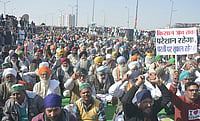The crises-ridden Pakistan slipped into a new political and legal crisis on Sunday when President Arif Alvi claimed that he did not sign into law two contentious bills giving more powers to the country's military and security establishment.
Alvi said that the presidential staff "undermined his will" and sent his assent to the bills. The two bills, namely Official Secrets (Amendment) Bill and the Pakistan Army (Amendment) Bill, were cleared by the Parliament before it was dissolved earlier this month and were notified as laws after the government received the presidential assent — which Alvi has now disputed.
The caretaker government, which is in charge of Pakistan till elections are held, has refuted Alvi's claims and has said the bills became laws as the President failed to return the bills within the stipulated time as per constitutional provisions.
Alvi, on his part, said he was under the impression that the bills have been returned properly. He has since sacked Secretary to the President.
The development comes at a time when Pakistan is facing a political crises and uncertain political future as the caretaker government is expected to last for severa months. The two major political blocs, one led by the Zardari-Sharif combine and the other of Imran Khan are also locked in a bitter tussle. Then there is the economic crises that Pakistan is facing for over a year now.
Here we explain what Alvi said, the response of the government, and the legal crises that the country now faces as the validity of the two laws are in question.
What did Pakistan President Ali claim?
Pakistan President Arif Alvi in a tweet on Sunday claimed that he did not sign Official Secrets (Amendment) Bill and the Pakistan Army (Amendment) Bill into laws and his assent was effectively forged.
Alvi claimed that he had confirmed with his staff that the bills were returned in time but was misled.
Alvi tweeted, "As God is my witness, I did not sign Official Secrets Amendment Bill 2023 and Pakistan Army Amendment Bill 2023 as I disagreed with these laws. I asked my staff to return the bills unsigned within stipulated time to make them ineffective. I confirmed from them many times that whether they have been returned and was assured that they were. However, I have found out today that my staff undermined my will and command."
Following the claim, Alvi sacked the Secretary to President Waqar Ahmed on Monday.
A tweet from the President of Pakistan's account read: "In view of the definite statement of yesterday, President’s Secretariat has written a letter to Principal Secretary to Prime Minister that the services of Mr. Waqar Ahmed, Secretary to President, are no more required and are surrendered to the Establishment Division, immediately."
The caretaker government, meanwhile, has said that the laws have been notified into laws as per established procedure.
President didn't return bills in time, assent was deemed: Govt
Pakistan's caretaker government has said that President Arif Alvi did not return the laws as per constitutional laws within stipulated time of 10 days.
Therefore, the bills were deemed to have the presidential assent after 10 days and thus the bills became laws, according to the government.
Caretaker Law Minister Ahmad Irfan Aslam said, "The president had the option to raise objections to the bills within the stipulated timeframe but he chose not to, leading to the automatic enactment of the bills into law...The president had only two choices [after receiving the bills]: approve the bills or send them back with objections. No third option exists, and if the bills are not returned, they become law automatically after 10 days."
Aslam further stated that the Pakistan Army (Amendment) Bill was received by the Presidency on Aug 2, while the Official Secrets (Amendment) Bill reached the president on Aug 8, reported The Express Tribune.
Within hours of Alvi’s claim, Pakistan's Senate Secretariant (upper house secretariat) issued a gazette notification saying the two bills were "deemed to have been assented by the president", reported Dawn, adding that notification said the Official Secrets (Amendment) Bill, 2023 was deemed to have been approved by Alvi with effect from August 17 and the Pakistan Army (Amendment) Bill, 2023 from August 11.
Why are the two bills so contentious?
The Official Secrets (Amendment) Bill (OSA), 2023 and the Pakistan Army (Amendment) Bill, 2023 are contentious because they increase the powers of the military and security establishment, which is already the most powerful bloc in the country.
For nearly half of its existence, the all-powerful military has run Pakistan directly and there have been a number of coups, most recently in 1999 when late General Parvez Musharraf took over the country after overthrowing the then-Prime Minister Nawaz Sharif. Even when the military is not directly ruling the country, it's understood to be highly influential and is said to be behind some of the most crucial policy and strategic decisions. Former Prime Ministe Imran Khan, who is now jailed and is out of favour, was understood to have been propped by the military. Pakistani PMs have often said to be 'selected prime minsiters' instead of 'elected prime ministers' as the military's approval is considered to be a must. When they don't tow the military's line, they are in trouble — as Khan learnt.
These two laws further strengthen the hold of the military and the security establishment by increasing punishment to what they might consider leak of state or military secrets or identities of officials.
The Dawn reports that Section 6-A of amended OSA creates a new offence of unauthorised disclosure of the identities of members of intelligence agencies, informants, or sources, which would be punishable by a jail term of up to three years and a fine of up to Rs 10 million.
For similar disclosures , the Army Act would punish people with up to five years in jail.
The Dawn further reported, "One of the amendments in the act accords more powers to the army chief and barred ex-servicemen from engaging in politics as well as taking up ventures, which could come into conflict with the army’s interest. It also proposed imprisonment for defamation of the army. The new law also forbids any person subject to the army act from engaging in any kind of political activity for two years from the date of their “retirement, release, resignation, discharge, removal or dismissal from the service."
Deemed assent or no assent?
The legal crisis which could now erupt in Pakistan is based on the interpretation of the constitution.
While the caretaker government says the president is deemed to have assented to the bills as the 10-day period was passed, legal experts do not have consensus on this, according to a report in Dawn.
Barrister Rida Hosain told Dawn that there is no automatic assent and such assent upon the passage of 10-day period only comes into action if the joint session of the parliament has been held. Notably, the National Assembly stands dissolved.
Hosain told Dawn that even if the president does not, in fact, give his assent, the deeming provision "only kicks in once the bill has been reconsidered and passed by parliament in a joint sitting under Article 75(2). There is no automatic deemed assent attached to an unsigned bill".
She added, "If the President’s claims are true, neither of these laws are valid pieces of legislation."
Barrister Asad Rahim Khan also told Dawn that within the scheme of Article 75, "deemed assent is relevant to the second time the president is sent a bill, and not the first".
He further said, "As this was the first round, the president’s express assent was essential for the bill’s passage into law — anything less is to have returned it under Article 75(1)(b), which does not mandate that any specific provision be addressed."
The conflicting legal interpretations, coupled with the political implications of the new laws, could plunge Pakistan into a legal and constitutional crises. Former Pakistan Foreign Minister and Pakistan Tehri-i-Insaaf (PTI) leader Shah Mahmood Qureshi was arrested under the Official Secrets Act. The provisions are bound to be used on other Opposition figures too as Pakistan faces deep political polarisation and a crackdown on PTI. Its leader Imran Khan is already jailed in a corruption case and faces dozens of pending cases.
The Pakistani National Assembly was dissolved earlier this month, which meant elections were to take place in three-months time. In the interim, a caretaker government would run the country. The elections have been delayed by at least three more months as delimitation exercise is to be carried out.
"The polls have been postponed until February as the electoral commission says electoral boundaries must be redrawn to reflect fresh census data, a months-long process, before polls can be held. The country is currently under a caretaker government," reported BBC News.
This means that the caretaker government could remain in charge for at least six-seven months. Then, the elections itself could take some time and then time would likely be consumed in hammering a coalition to get the majority-mark. This means that Pakistan is set to be under a weak caretaker government for a long haul that already has a looming constitutional crises. There are also fears that parties might approach the Supreme Court over elections and delimitation which could mean a bitter legal battle too.


























